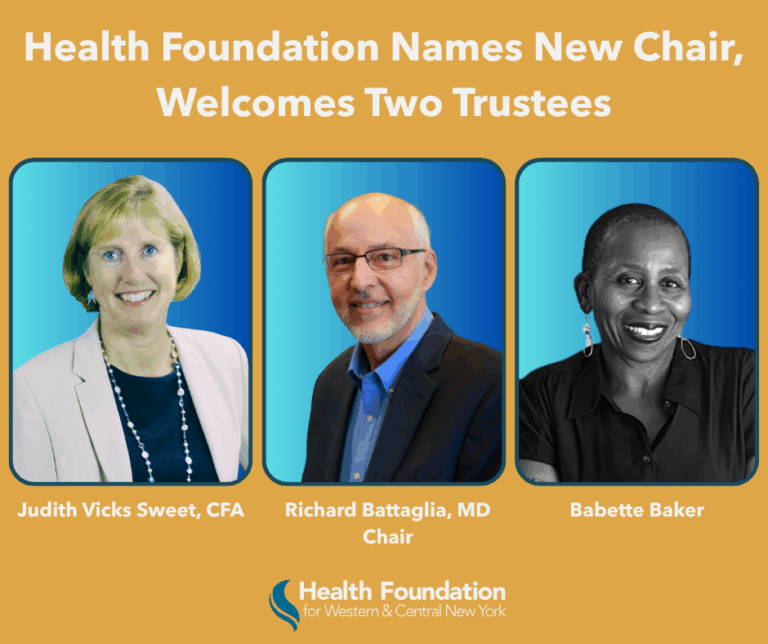In early December, we asked our local community of nonprofit organizations: how has the COVID-19 crisis had an impact on your work? We were overwhelmed and moved by the many responses we received, though not surprised, as these comments reflect the urgent situation we have witnessed in ongoing conversations with these agencies.
The challenges faced by community-based organizations have largely been left out of the national conversation around relief efforts. Therefore, while this would normally be our end-of-year newsletter highlighting our own work, we are using this space to share some of what we have heard from leaders in the nonprofit sector. We have also used your feedback to inform a message to our elected officials as we continue advocating for robust, comprehensive relief programs that provide aid to community-based organizations.
I hope that reading these testimonials imparts the seriousness of this situation. We have asked our elected officials to please do all they can to ensure the following are part of any current or future relief funding packages:
- Increase funding for state, local and tribal governments to help them balance their budgets and avoid more cuts. This funding is imperative.
- Ensure nonprofit organizations are included in any relief for small businesses, such as an additional round of the Paycheck Protection Program.
- Increase in the federal match for Medicaid programs. More than 300,000 New York residents have enrolled in Medicaid since the beginning of the pandemic, with similar increases happening across the country.
- Guarantee food security and support organizations that address food access by expanding eligibility for and increased funding to SNAP and other food assistance programs.
- Ensure organizations have access to and funding for personal protective equipment (PPE).
Again, I send my thanks to each member of our nonprofit community as you continue to go above and beyond to meet the needs of the people you serve. We will continue to use our voice to advocate for the relief and assistance you need and deserve.
— Nora OBrien-Suric, PhD, President, the Health Foundation
What We Are Hearing From Nonprofit Leaders
Note: Some comments have been edited for length.
“In the beginning of the pandemic, we lost over 70 percent of our funding through the decrease in in-person interpreting requests and cancellations when many health facilities, schools, places of employment, county and city offices, and other venues had to close down. Deaf people who need ASL interpreters were cut off from services for many months. Our staff began the hard work of advocating that providers switch to video interpreting, and that public officials use interpreters for all essential public communications, such as press conferences. We also began to address the unique communication needs of Deaf people in the quarantine hotels and worked towards the development and distribution of clear masks, to enhance communication.” – Pam Kefi, Executive Director, Deaf Access Services
“I would like organizations to recognize the important work nonprofits do every day as well as the large percentage of people they employ. I would like to not have to rely on grants for 95% of my budget and fitting in fundraising along with our day-to day operations. I would like contracts for the services we provide. And I would like to never furlough another employee. Is that too much to ask?” – LuAnne Brown, Chief Executive Officer, Buffalo Prenatal-Perinatal Network
“We have lost New York State funding because they are in a financial crisis and cannot honor non-mandated grants. We have had to limit the number of youth we are serving at our shelter so we can properly social distance them when they are sleeping. We have had a very difficult time hiring people at this time. We did not get the PPP grant because we still had grants paying for our salaries, so we did not want to double dip. At this point, because we have lost the funding, we have not hired for two open positions and we are on an austerity budget. If we could get money from the federal government, we could hire the needed employees. Our staff is very overworked at this point and it would be great to give them some relief.” – Lisa Freeman, Executive Director, Compass House
“Our patient numbers have dropped – clients are not comfortable coming in OR don’t have phones/internet to reach out and are unsure if they can come in. Our earned revenue has dropped. Our staffing has been negatively impacted by lack of childcare with lack of consistent schooling. We weren’t able to have interns or volunteers, so projects have dropped/had to stop.” — Jessica Soule, Director of Strategic Partnerships, East Hill Medical Center
“We provide supports to people with intellectual and developmental disabilities in 24/7 residences, day services, employment programs, respite and life skills services, and preschool special education. We are working diligently to keep people and staff safe and healthy… We have lost significant revenue due to program suspensions and closures. We have had to acquire new technology to support people remotely whenever possible. Staff anxiety is off the charts, and morale has been affected. Family members were unable to visit their loved ones in group homes for months, and community outings were suspended along with day services, which affected the inclusion and quality of life of the people we support. I have worked in not-for-profit leadership for 20 years, and I have never seen another crisis quite like this. The stress of this year is unlike anything else I have experienced in my career. I hope we never see anything like it again.” – Jeff Patterson, Chief Executive Officer, Empower
“The decline in the economy has created an influx of new clients to our food pantry. With soaring unemployment rates, clients are coming to us in increased numbers to assist them with food. There also has been an increase in calls to our helpline for human basic needs, such as, but not limited to, household goods, and baby and childcare supplies. As COVID-19 continues, there has become a higher number of exposure incidents to our full-time and part-time employees, causing a workforce shortage during the period of quarantine. Financial loss throughout the economy has created local government financial withholdings with no clear answer there will be a supplemental stimulus package to provide critical funding. As a community based agency, we are forced to restructure our budgets and service delivery methodologies.” — Michael Sagnibene, Director of Family Services, Family Help Center
“Loss and/or reduction in state funding has impacted our organization’s operating budget as well as our ability to be impactful in our communities. State contracts have not been renewed (e.g., Creating Healthy Schools and Communities grant) and Rural Health Network Development Program funds have been cut by 30% (i.e., $48,000). Loss in state funding makes covering indirect costs such as insurance, accounting, and administrative overhead more challenging. HCA has been responsive to community needs through COVID Response Funds and other private grants and, while collaboration is critical in these initiatives, it can be laborious and time intensive, adding further stress on an already stretched staff.” — Ann Battaglia, Chief Executive Officer, Healthy Community Alliance, Inc.
“Obtaining funding for the upcoming year of this program has been very difficult as many sources of funding are focused on essential-need programs and not programs that assist with social isolation and social-emotional health. As a result, our program will not be able to continue until funding is obtained for programmatic expenses. Economic relief would permit program continuity and would impact the older adults in our community by providing a resource that offsets the COVID-19 related social impacts, such as social isolation and increased mental health issues.” – Project Lead, Lifelong Learning at SUNY Oswego
“The COVID-19 pandemic has left thousands of people unemployed who are now struggling to afford housing and other basic necessities. MVLA has seen an exponential increase in people needing rent relief and income to afford groceries and other products to support their families. This has been a challenge because our organization is currently made up of only two employees who are struggling to meet the needs of the growing number of clients.” – Maria Montero Silva, Communications Coordinator, Mohawk Valley Latino Association
“The number of volunteers we have has decreased. Many feel unsafe or are apprehensive about serving. Additionally, many of our volunteer stations and collaborating organizations remain closed to the public, or have ceased all volunteer activities due to social distancing, state directives or simply not having volunteer opportunities for volunteers to do at home. These COVID-19 related changes have impacted our program by [preventing] the accumulation of volunteer hours as well as prohibiting the completion of outcomes and goals as required by grantors. Economic relief packages would give our program the necessary funding to implement volunteer opportunities that can be performed while social distancing or while at home.” – Project Director, Retired & Senior Volunteer Program of Oswego County
“The biggest impact has been on our neighbors, the people we serve. Many are struggling with layoffs and furloughs, housing insecurity, and health issues for which they fear going to doctors’ offices and hospitals. They are also struggling to ensure that their children are able to attend to their educations and that someone will be able to watch over them when parents are at work. Everyone, of course, is burdened by the worry that they, or someone they love, will contract COVID. The uncertainty has increased their need for our services and, thankfully, our staff has risen to the challenges. Funders have stepped in to fill gaps, and community organizations have increased their donations of food and other essentials. In the worst of times for our neighbors, we have seen the best of what this community has to offer.” – Brian Fay, Executive Director, Syracuse Northeast Community Center, Inc.
“The YMCA’s operating model relies primarily on three economic engines to fuel the delivery of our mission in the communities we serve: membership, program and philanthropy. Since March’s closure, we have suffered a $1.6M loss in revenue from membership and program. Currently, we have only retained 49.8% o our membership base. Although we were able to have some significant expense savings through the closure in payroll, utilities, and program related expenses, the Y responded with new initiatives to meet some critical community needs caused by the pandemic. These new programs were not revenue generating responses and relied heavily on philanthropic support. The biggest challenge is to balance long term sustainability with the short term needs and delivering our mission with a broken operating model.” – Barb Sweitzer, CEO, YMCA of the Twin Tiers
“Our organization has been significantly impacted financially. Due to COVID, we closed for 4 months which resulted in self generated income lost of over $50,000, staff layoffs, and services not provided/ being provided at a much reduced level. We typically rely on fundraising to fill our budget gap, but contributions are way down due to low consumer confidence… [Relief funding] would be huge. It would provide the funding that is missing to keep the organization whole until business is back to usual as well as would keep employees off unemployment. It needs to come sooner rather than later.” – Anonymous
“Our organization has had new client growth as families have been affected by job closings and food shortage. We have also identified a need to work in rural communities who have issues with transportation and the inability to travel to the inner city for diapers and wipes. [Funding] would allow our organization to set up other locations within communities that we aren’t reaching presently and help families who aren’t able to travel. It would also ensure that families have some level of relief as we enter into a new year in an uncertain time.” – Raziya Hill, Every Bottom Covered
“My biggest challenge throughout the pandemic has been booking enough blood drive to meet our region goals which are calculated based on patient need in the area. We have lost many regular sites at High Schools, Colleges and businesses. To recoup these lost units, we have shifted our efforts to running at community locations. Our current Blood Program Leaders have been very generous and welcoming, but we are still struggling to book enough blood drives. As a courtesy and to prevent burn out from our current partners, I have been seeking new community connections. With everything going on, understandably, many of my communications go unanswered. The Red Cross has campaigns on a national level as well, but I find these personal connections yield better relationships and engagement. Support from local government and civic organizations can be very influential in the communities I serve.” – Stephanie Mahoney,
American Red Cross Account Manager in Herkimer & Madison Counties
“Our enrollment is down very low which impacts the budget. We need a certain amount of children in care to remain viable. We have had to let go staff and cut back hours. We need to support the program budget so that we can still provide care to working families if our numbers are low.” – Marybeth Simoneit, LaSalle Early Childhood Center



